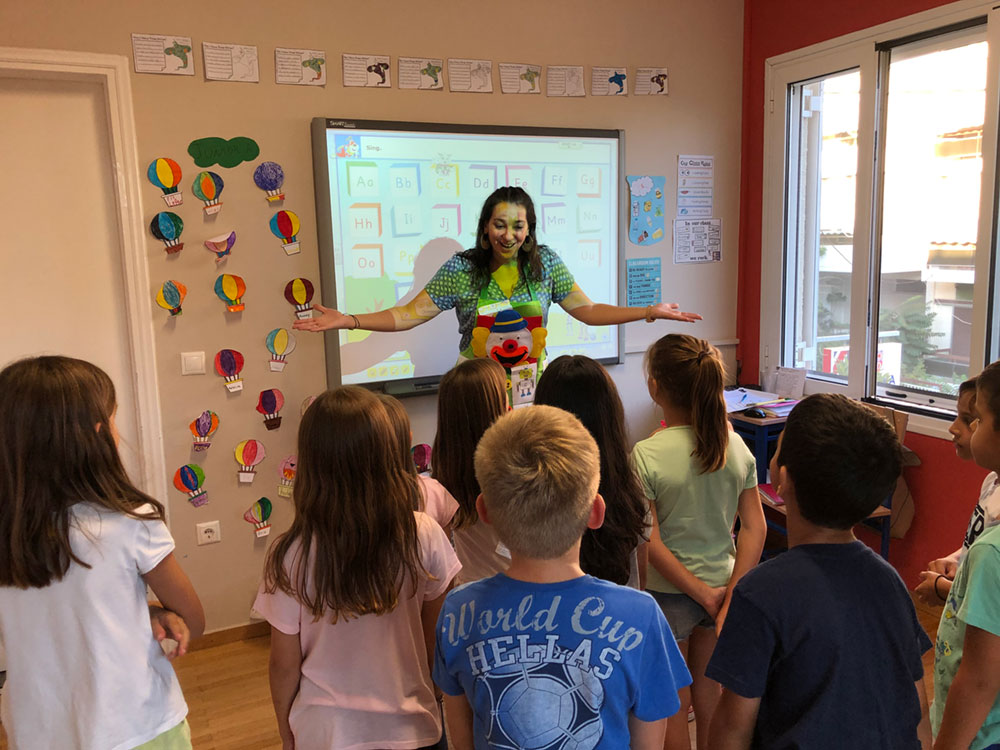I always perceived teaching as a happy journey; as an adventure both for the teacher and the students. Having this as my driving force I decided to make each lesson an adventure, a fantasy and a surprise for my students with innumerable benefits for them and for me.
I started organizing my lessons through my students’ eyes; their likes, their passions, their beautiful world. I wanted English lessons to make sense in their lives and their lives to be part of the lessons. So, I realized that the only thing that really matters to young children is PLAY. Wow! This simple discovery changed my way of teaching and the rewards I received from my students’ participation and love for English went beyond my imagination.
BY HELEN DOUGEKOU, EFL TEACHER, DRAMA TEACHER, LANGUAGE SCHOOL OWNER. DIRECTOR OF STUDIES
Now, I always include in my classes:
Drama games!
These are vocabulary and grammar games with a lot of action, a lot of communication and cooperation and simple rules. Each game is like a competition with rewards for both teams! Students speak English naturally because they forget that they are having a lesson.
Who is missing? (Scher, A. & Verrall, C. 1975) is a good observation Drama game for young children.
They all run around the room several times. On ‘Freeze- eyes closed’, they stop still and close their eyes. Then they are instructed to make themselves into a small ball on the ground, their eyes closed all the time. The teacher tiptoes towards one child and taps him on the back, motioning him to hide outside the door. The children, who still have their eyes closed, are told to stand: then they are told to run round again and open their eyes! At ’freeze’ the teacher asks ‘Who is missing?’ and so the game continues.
Chants and songs!
Vocabulary is taught in sentences and with grammar in context. Not only do we sing but we always act them out. Students use grammar correctly without having to memorize boring rules.
Bread and Butter Hello Chant or Song (Hillyard, S. 2016)
To the tune of “Twinkle, Twinkle Little Star”
Bread and Butter, (hold out one hand, palm up and ‘spread it with imaginary butter)
Marmalade and jam, (keep spreading)
Let’s say hello (indicate the whole class by making a circle motion with one hand all around the circle or classroom)
As quietly as we can (with the other hand put finger to your mouth in a shushing sign)
Hello! (say quietly)
Bread and Butter,
Marmalade and jam,
Let’s say hello
As loud as we can (hands to mouth in a shouting sign)
Hello! (say loudly)
Robin Hood Raps (Mitton, T. 2007) is another great idea.
- Projects! We do projects in which we use targeted vocabulary. We exchange ideas; we search for sources, for pictures and when we are ready we present our projects on our mini stage. Children now love doing presentations and have become confident speakers.
- Create your own Superhero
- Develop a new product
- Create your ideal English school
- Role playing! We put on masks, hats, special glasses, costumes and we become animals, reporters, chefs, explorers, sailors and many more. We act like the person or the animal that we role play and we use our voice and our body to express ourselves. Many times we role play real life situations where the students love to improvise.
- At a tourist information office
- Enrolling at a gym
- At the train station
- Visiting the doctor
- Reporting a crime
- Story telling!
I choose books that teach children crucial lessons about life! What they love is talking afterwards about the story and acting it out. We use storytelling aprons, storytelling gloves, flashcards and puppets! We use theatrical methods and we perform on our stage!
Wake me in Spring by James Preller. A powerful story about friendship.
Bear is getting very sleepy. But Mouse thinks Bear should stay awake for Winter.
- Crafts! We do a lot of crafts to learn grammar and vocabulary and we describe them. Children feel proud of them and happily present them.
It can be wall displays, mini-projects, cut and stick activities.
Through these activities students are fully motivated, encouraged to participate wanting the lesson never to end. As they learn English as a group they are encouraged to help their team succeed and learn to cooperate and feel part of a team. In these teams they feel valued and respected. They learn how to celebrate their “victory” and how to manage their “defeat”. They never give up in PLAY. These structured play-based lessons help them learn English naturally and quickly.
Because happy students learn better!
References
Hillyard, S. (2016). English through Drama.
Scher, A. & Verrall, C. (1975). 100+ Ideas for Drama.
Mitton, T. (2007). Robin Hood Raps.
